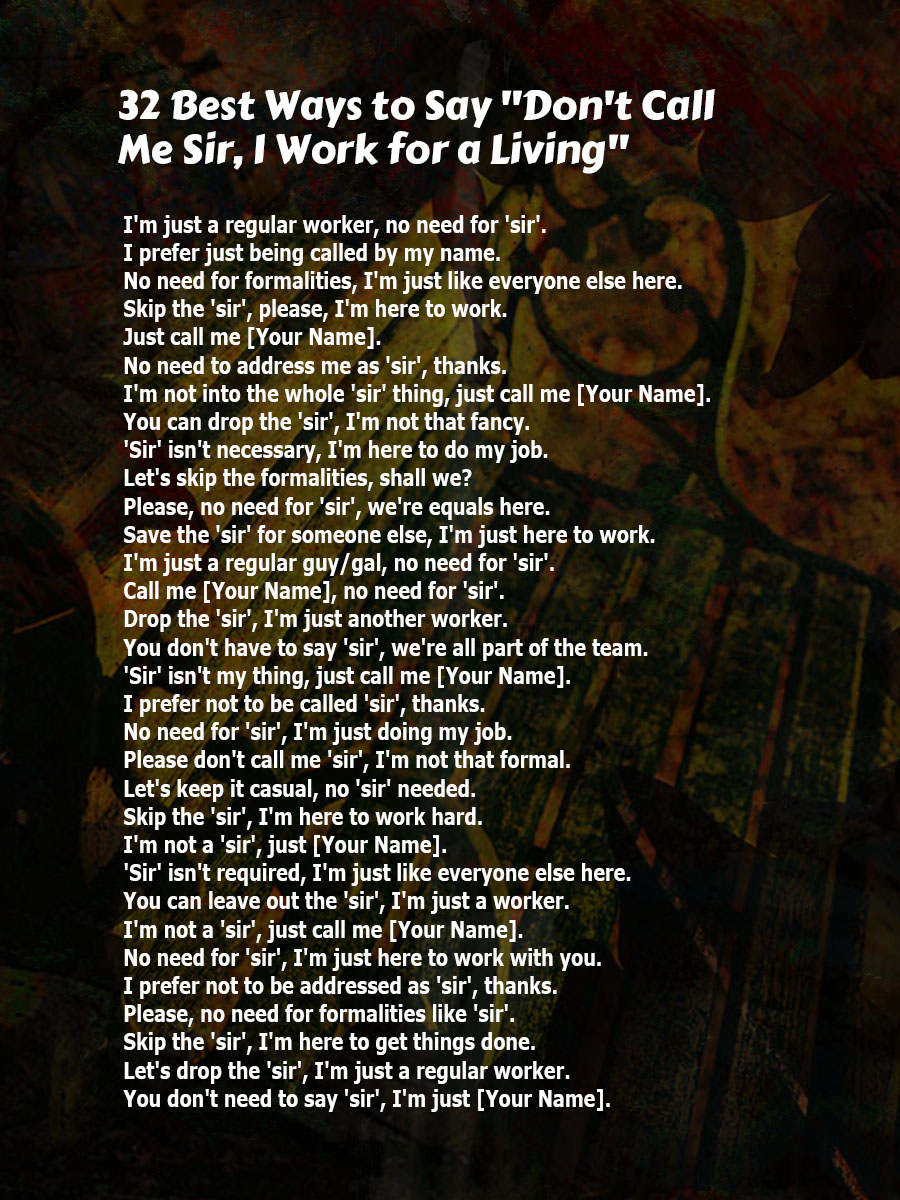Ever wanted to spice up how you tell someone not to call you ‘sir’ at work? You’re in luck! We’ve gathered 32 awesome ways to politely say, ‘Don’t call me sir, I’m a hard worker!’
Whether you’re aiming for humor, assertiveness, or a touch of creativity, these phrases will help you navigate those workplace interactions with style. From witty comebacks to friendly reminders, there’s a phrase for every situation.
Get ready to add some flair to your daily office conversations and make your point without missing a beat. Let’s dive into these 32 amazing ways!

Here are 32 Best Ways to Say “Don’t Call Me Sir, I Work for a Living”:
- I’m just a regular worker, no need for ‘sir’.
- I prefer just being called by my name.
- No need for formalities, I’m just like everyone else here.
- Skip the ‘sir’, please, I’m here to work.
- Just call me [Your Name].
- No need to address me as ‘sir’, thanks.
- I’m not into the whole ‘sir’ thing, just call me [Your Name].
- You can drop the ‘sir’, I’m not that fancy.
- ‘Sir’ isn’t necessary, I’m here to do my job.
- Let’s skip the formalities, shall we?
- Please, no need for ‘sir’, we’re equals here.
- Save the ‘sir’ for someone else, I’m just here to work.
- I’m just a regular guy/gal, no need for ‘sir’.
- Call me [Your Name], no need for ‘sir’.
- Drop the ‘sir’, I’m just another worker.
- You don’t have to say ‘sir’, we’re all part of the team.
- ‘Sir’ isn’t my thing, just call me [Your Name].
- I prefer not to be called ‘sir’, thanks.
- No need for ‘sir’, I’m just doing my job.
- Please don’t call me ‘sir’, I’m not that formal.
- Let’s keep it casual, no ‘sir’ needed.
- Skip the ‘sir’, I’m here to work hard.
- I’m not a ‘sir’, just [Your Name].
- ‘Sir’ isn’t required, I’m just like everyone else here.
- You can leave out the ‘sir’, I’m just a worker.
- I’m not a ‘sir’, just call me [Your Name].
- No need for ‘sir’, I’m just here to work with you.
- I prefer not to be addressed as ‘sir’, thanks.
- Please, no need for formalities like ‘sir’.
- Skip the ‘sir’, I’m here to get things done.
- Let’s drop the ‘sir’, I’m just a regular worker.
- You don’t need to say ‘sir’, I’m just [Your Name].
See Also: 30 Great Ways to Reply to Don't Break My Heart
Asserting Individual Identity
Asserting individual identity in the workplace is crucial for maintaining personal autonomy and professional respect. One common way to affirm your personal identity and professional status is by rejecting traditional hierarchical titles and promoting equality.
Rejecting Hierarchical Titles
Rejecting hierarchical titles is a powerful way to assert individual identity at work. Instead of being addressed as “sir” or “ma’am,” individuals can request to be called by their first name or a neutral title such as “Mr.” or “Ms.” This shift in language emphasizes the value of every individual’s contributions, regardless of their position within the organization.
Promoting Equality
Promoting equality in the workplace involves advocating for fair and respectful treatment of all employees. Encouraging colleagues and superiors to address one another on equal terms fosters a culture of mutual respect and collaboration. This approach helps to break down hierarchical barriers and creates a more inclusive and supportive work environment.
Navigating Workplace Dynamics
Creating A Professional Environment
To create a professional environment within your workplace, it’s important to establish clear boundaries and expectations. Employees should be mindful of their own behavior and the language they use when addressing colleagues. Here are some tips to consider:
- Use professional language and tone in all communications.
- Address colleagues by their preferred names or titles.
- Avoid using derogatory or condescending terms.
- Respect personal space and privacy.
Creating a professional environment fosters respect and open communication among team members. It sets the tone for mutual respect and positive workplace interactions.
Encouraging Mutual Respect
Mutual respect is the foundation of a healthy workplace. It involves treating colleagues with dignity and acknowledging their contributions. Here are some ways to encourage mutual respect:
- Active listening: Pay attention to what others are saying and respond thoughtfully.
- Recognize achievements: Acknowledge the accomplishments of your colleagues.
- Give credit: Recognize and appreciate the efforts of others.
- Collaborate: Foster a collaborative environment where everyone’s ideas are valued.
- Empathy: Show empathy towards your colleagues’ challenges and concerns.
Being nice to each other helps us get along better and work together well. When we respect our colleagues, they usually respect us back and we can all do better work together.
Effective Communication Strategies
In any workplace, it is important to establish effective communication strategies to ensure smooth and respectful interactions among colleagues.
When it comes to addressing individuals who insist on using the honorific “Sir,” it is crucial to set boundaries politely and use assertive language.
These strategies can help convey your message while maintaining professionalism and respect. Let’s explore two effective communication strategies that can be utilized in such situations.
Setting Boundaries Politely
When faced with the inevitable situation of being called “Sir” in the workplace, it is essential to establish boundaries politely. By politely clarifying your preference, you can assert your identity as a hardworking individual while maintaining professional decorum. Consider using phrases like:
- Actually, I prefer to be addressed by my name.
- Please, call me [insert your name] instead of Sir.
- I appreciate the intention, but I prefer not to be called Sir.
These responses convey your preference clearly and politely, setting the tone for respectful communication moving forward. Remember to align your body language with your verbal communication, maintaining a confident and approachable demeanor.
Using Assertive Language
Assertive language is crucial when addressing the issue of being called “Sir” in the workplace. By choosing your words thoughtfully, you can communicate your preference while ensuring that your message is clear and respectful. Consider using assertive language such as:
- I would appreciate it if you would refer to me by my name rather than Sir.
- It would be more accurate to address me as [insert your name].
- Please refrain from using Sir when referring to me, as I prefer to be addressed by my name.
Using assertive language empowers you to assert your preference confidently while acknowledging the respect others intend to convey. By addressing the matter directly, you can foster a workplace environment that values open and respectful communication.
Cultural And Societal Reflections
Examining Power Dynamics
Power dynamics are at play when someone uses the expression “Don’t call me sir, I work for a living.” This refusal of social titles challenges the assumption of authority based on superficial hierarchies.
Challenging Traditional Gender Roles
By rejecting the address of “sir,” individuals are challenging traditional gender roles that have long been associated with titles and honorifics. This act defies predefined gender expectations and encourages inclusivity.

More Responses You Can See
- No need for the ‘sir’, I’m just another team member.
- Please, skip the ‘sir’, I’m here to contribute like everyone else.
- I’m not a ‘sir’, just call me [Your Name].
- You can leave out the ‘sir’, I’m just here to do my job.
- Skip the formalities, I’m just [Your Name].
- I prefer to keep it casual, no need for ‘sir’.
- No ‘sir’ needed, I’m just part of the crew.
- Please don’t call me ‘sir’, I’m not that formal.
- Let’s drop the ‘sir’, I’m here to work alongside you.
- I’m not ‘sir’, just [Your Name].
- You don’t have to say ‘sir’, I’m just here to work hard.
- Skip the ‘sir’, I’m just a regular employee.
- No need for ‘sir’, I’m just like everyone else here.
- I prefer to be called [Your Name], without the ‘sir’.
- Please, no need for the formal address ‘sir’.
- I’m just [Your Name], no need for ‘sir’.
- You can drop the ‘sir’, I’m just here to get things done.
- I’m not a ‘sir’, just a worker like you.
See Also: 35 Best Ways to Say "Let Me Know If Otherwise"
I hope these ways help you say “Don’t call me sir, I work for a living” in a polite and clear manner. You could say, “Please call me by my first name,” or “I prefer not to be addressed as sir.” Another way could be, “I’m just a regular worker, so please skip the sir.” Remember, being respectful and direct is key to getting your message across nicely.









